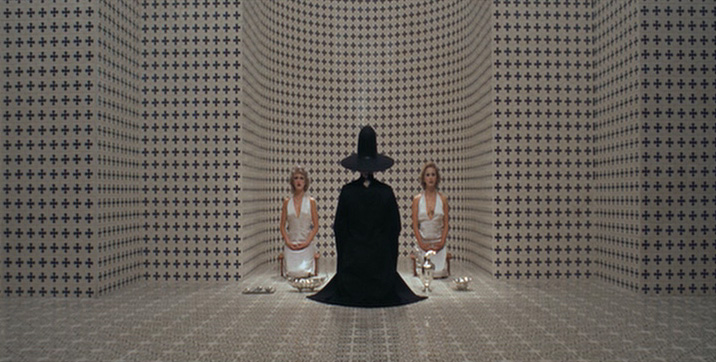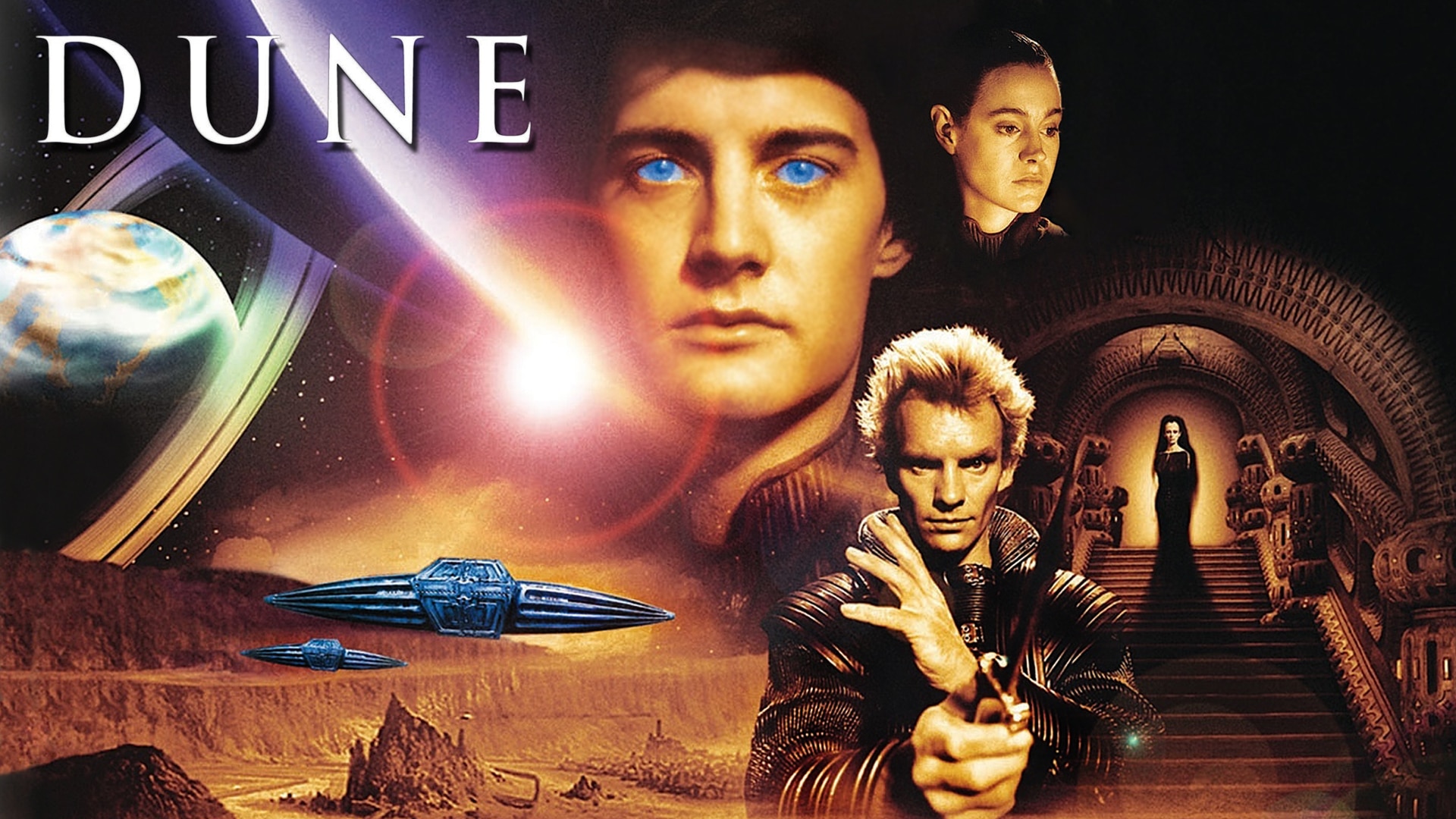It was something. But more on that in the conclusion.
My personal excuses for not watching were:
1. Indeed never hearing anyone say it was good.
2. Being a cheapo who doesn't like to pay (upfront) for movies anymore. (Dune is not on Netflix or Hulu Plus).
3. A fear of watching David Lynch do an adaptation instead of an original story, because it might be void of soul and a waste of time.
For some mislead reason, I felt as though Lynch's adaptations would be something he did for money; paying his dues before he could break out and make another movie like Eraserhead. However, after seeing The Elephant Man - based on a book of the same title - it was clear that it was possible for Lynch to make an adaptation all his own.
 |
| David Lynch is as David Lynch does. |
I decided to give Dune a try after seeing the YouTube video Lost In Adaptation: Dune. I'm a jerk to myself when it comes to spoilers, so having not read the novel by Frank Herbert, nor seen the movie, my interest was piqued. The video was created by The Dom, who has a series called Lost In Adaptation, in which he reviews movies compared to their paper counterparts. This series has the perfect balance of comedy and insightful analysis. I enjoyed watching several of them, including The Shining - which I adore as a film, and may actually read thanks to The Dom.
The Dom joked about how the below shots were not only inaccurate to the book, but also completely f#%ked.
 |
| Seems legit |
Meanwhile, I was thinking: Dune where have you been all my life?! This kind of imagery convinced me David Lynch actually directed Dune. Maybe it wasn't neutered after all. Prepared to see the film, I went in knowing that this was not the most loyal adaptation of the book. That only made me more excited to see how Lynchian Dune truly was.
Since Dune was book-ended by The Elephant Man and Blue Velvet, I couldn't help but find ways that Dune showed signs of Lynch warming up to make Blue Velvet. Maybe Dune wasn't a success. Maybe Lynch lacked control, and didn't appeal to audiences within the scifi genre. Blue Velvet would be his first original film in nine years, and this time around he would get it right.
Dune and Blue Velvet are not similar films in a general sense. One is a scifi epic, the other is a modern noir mystery. However, there were observable Lynch parallels on the surface that I would like to share.
Lynch's portrayal of Dune's Baron Vladimir Harkonnen as a screaming, intense, and vile character are revealed once more in Blue Velvet's Frank Booth (Dennis Hopper). Both show extreme mood swings, expressing anger and joy in terrifying ways.
 |
| Pictured: That emotion where you scream, spit, laugh and punch at the same time. |
They both "blow-off steam" in nightmarish style. While the Baron will melt in ecstasy watching a young man die by heart-plug removal, Frank Booth is a rapist who huffs nitrous, cries, and shoves fabric in his mouth.
It's believed that Lynch's Baron was way over-the-top compared to the novel's Baron, who was more cold and calculating. Considering there was obvious citicism over Lynch's interpretation, it's possible that this character was invented by Lynch, who wanted to use Dune as a vehicle for that creative concept. Lynch says of his time making Dune,
"I started selling out on Dune. Looking back, it's no one's fault but my own. I probably shouldn't have done that picture, but I saw tons and tons of possibilities for things I loved, and this was the structure to do them in. There was so much room to create a world. But I got strong indications from Raffaella and Dino De Laurentiis of what kind of film they expected, and I knew I didn't have final cut."
This version of the Baron may not have been popular with Dune fans, but Blue Velvet's noir backdrop would be perfect for such a jarringly evil villain.
The company the villains keep is familiar from one film to the next. Once again Jack Nance, Dean Stockwell, and Brad Dourif are on the bad guy's side.
 |
| Above: Piter De Vries, the Baron's Mentat. Below: Raymond, Frank's friend with a silver suit and a switch blade. |
 |
| Above: Nefud, a henchman. Below: Paul, also a henchman. |
Obviously Kyle MacLachlan is back as the hero.
 |
| Jeffrey Beaumont of Blue Velvet |
MacLachlan's performance as Paul Atreides was a bit stoic, of not rigid. There's a level of innocence he brings to this role that doesn't work for a young man who develops into a warrior. Really all the whispered inner thoughts couldn't portray the character development that actually happened for Paul in the novel (which I have to admit I can only say in reference to reviews I read, as I have yet to read Dune). However, that innocence works for foolhardy Jeffery Beaumont, who dives into a murder mystery and nearly cracks under the pressure.
The sexy factor also works better for MacLachlan in Blue Velvet over Dune.
Because this works
and this really really doesn't for some reason.
 |
| NOPE!NOPE!NOPE! |
This so disturbing to me! Why is this so disturbing to me?! Is this trying to imply a future culture where covering the arms and collar bones but revealing the nipples and belly button is sexy for men? That outfit isn't even in the movie! It's a promotional photo, proving how sexy Dune is (it's not at all btw). It made me really sad to look up this photo again* so I could put it in this post, but the people need to know.
* I say "again" only because I came across it while researching, and quickly clicked away from it in shame. Unfortunately I knew I had to share it with others - like a gypsy curse that needs to be broken.
Aside from casting, there are stylistic tidbits I observed:
A scene in Dune in which a pilot is killed, and his dead body is still sitting up wavering a bit in the seat, reminded me of a similar scene in Blue Velvet when the Yellow Man is inexplicably standing dead(ish) with a bullet in his head. In Dune it was a creepy choice to keep the dead pilot in his seat. Most action scenes in movies would have a pilot quickly killed and on the floor; with the attention on the killer taking over the controls. Keeping the pilot in his seat is disturbing, and brings attention to the violence of the scene, which is what the corresponding scene in Blue Velvet achieved.
This wasn't just a pin being knocked down, this was a man. It shows that death is not so final; the body will still be there. Unfortunately I couldn't find a photo, gif or clip of that scene in Dune, so you'll have to trust that it looked much like the .gif above from Blue Velvet.
There was also fire, and visions/dreams, and dreams with fire.
 |
| Still from a hallucination. |
Fire is a common thread in Lynch's films. Dune was not immune to that. Though, I thought his depictions of Paul's visions were a little like a commercial for water purifiers.
See, that's not even scary or cryptic.
 |
| Best shot in Dune. Bad ass little girl. |
This incarnation of the film did not get me excited to learn about the Dune universe. It was difficult to follow, plain and simple. I spent most of my time trying to enjoy whatever I recognized as Lynchian. It was more like playing bingo. Ultimately The Elephant Man was a better adaptation in using his archetypes while also telling a coherent story.
My next endeavor will be to watch the documentary Jodorowsky's Dune. I thought Alejandro Jodorowsky's The Holy Mountain was insane in a very good way, and visually outstanding. The idea that he was also a contender for making Dune is really exciting. Though he wasn't the one who ended up making it, the story behind his concepts must be wild.
 |
| Still from The Holy Mountain |
Until next time!







